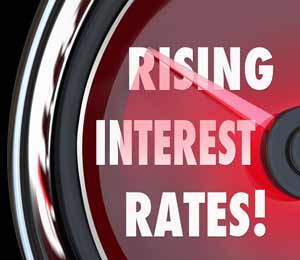 Will the Fed raise interest rates in March 2017? Right now, CME Group's FedWatch tool, which is a gauge of the market's expectations, places the odds of a rate hike at 88.6%.
Will the Fed raise interest rates in March 2017? Right now, CME Group's FedWatch tool, which is a gauge of the market's expectations, places the odds of a rate hike at 88.6%.
And investors are expecting a rate hike in March for two reasons...
First, Fed officials said in December 2016 they want a total of three rate hikes in 2017. There has already been one FOMC meeting in January 2017 (where rates were left unchanged), which leaves seven more meetings for Chair Janet Yellen to increase rates.
Yellen could space out the hikes in three-month intervals, raising rates in March, July, and December 2017.
The second reason markets expect a March 2017 rate hike is the comment Yellen made on March 3.
So the only major economic data that could deter FOMC members from raising rates is the February jobs report, which will be released on March 10.
Analysts are expecting 195,000 new jobs were created in February, with an unemployment rate of 4.7%. If the February job totals fall in line with expectations, the Fed would most likely proceed with a rate hike.
And while the words "FOMC meeting" and "rate hikes" will dominate headlines over the next few weeks, there will be very little coverage on how an interest rate hike affects your money.
That's why today, we wanted to make sure Money Morning readers know exactly what to expect after the Fed raises rates...
How Raising Interest Rates Affects Your Money
[mmpazkzone name="in-story" network="9794" site="307044" id="137008" type="4"]
After an interest rate hike, the U.S. dollar becomes stronger. With fewer people able to pay back higher interest rates, money becomes scarcer. You see, more money being easily available (like it is in times of low rates) makes it less valuable. But with less money in circulation (during times of climbing rates), it can become more valuable.
This makes importing goods from foreign countries cheaper. Theoretically, those savings can be passed on to the U.S. consumer, which could encourage more consumer spending.
However, there are also negative consequences to a strong dollar. When the dollar is strong, it costs more for foreign companies to import U.S. goods.
According to a Duke University/CFO Magazine Global Business Outlook survey in 2015, two out of three companies considered big U.S. exporters (those with one-fourth of their total sales overseas) said a stronger U.S. dollar would have a negative impact on their businesses.
Higher interest rates also have a major bearish impact on gold and silver prices.
Gold and silver are viewed as portfolio protection against volatility in the stock market. But because gold and silver don't offer dividends or interest appreciation, savings accounts and bonds are more appealing investments when interest rates are raised.
Investors would rather have their money earn them interest, so the demand for gold and silver can drop. When that demand drops, precious metal prices fall.
The stronger dollar also impacts precious metal prices because gold and silver are priced in U.S. dollars. It costs foreign countries more to purchase gold when the dollar is stronger.
Foreign investors are less likely to buy gold at higher prices.
Outside of the dollar strength and precious metals, rising interest rates also have a major impact on auto loans, mortgage rates, credit cards, and the travel industry.
- Auto Loans: Because of the stock market crash of 2008, auto companies have relied on loans with low rates to attract customers. In February 2009, light vehicle sales hit 9 million. By November 2015 those sales climbed to 18 million annually. Car loans can average between 2% to 3% now, but car loans were 8% before the crisis, according to CNBC.
- Mortgage Rates: An interest rate hike won't affect you if you have a fixed mortgage. You are locked in at one rate, no matter what the Fed does. But if you have a mortgage with adjustable rates, you will start to see higher bills monthly or annually. Buying a house before Fed meetings can help you potentially lock in a lower interest rate before the end of 2017.
- Credit Cards: Most credit cards have variable interest rates, which means your payments will go up quickly if the Fed raises interest rates. And if the interest rate increases, your minimum payment will also increase. According to Forbes, most major credit companies will take a percentage of your principal and add the interest accrued during that period to create a new minimum payment.
- Travel Industry: A Fed rate hike can mean cheaper travel expenses for Americans visiting foreign countries because the dollar is stronger. European central banks and the Bank of Japan (BoJ) easing programs for their national currency also helps you buy more for less.
The Bottom Line: The markets expect an interest rate hike in March thanks to Yellen's hawkish tone and the fact that the Fed has planned for three rate hikes this year. An interest rate hike will make the U.S. dollar stronger and can affect the precious metal market, auto loans, mortgage rates, credit cards, and the travel industry.
Want to Make Money? Here's how to make over $100,000 starting with a small amount of money... rolling stocks over and over again. Click here for this proven investing method...


